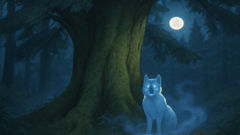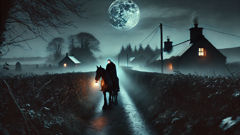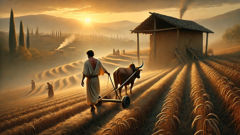Introduction
Mist drifted like ghostly fingers through the ancient forests of Kyushu, wrapping every gnarled branch and mossy stone in a gentle, almost sacred hush. The cedars here were centuries old, their roots tangled deep in memory and legend. It was a place where the old spirits were said to linger, and where children dared each other to walk alone after dusk. Among the villagers of Kawasemi, there was one story that returned every autumn, when the wind rattled through the boughs and the moon turned the forest silver: the myth of the Hoko. Parents spoke of it in whispers, warning their children not to stray too far from the paths. Some described it as a dog with sapphire eyes and fur as soft as moss, said to appear from the hollows of ancient trees. Others believed the Hoko was a spirit born of the forest’s will, a silent guardian that watched over the groves, protecting them from axe and flame. Yet for all the stories, no one could say what the Hoko truly wanted—or what price it might demand for disturbing its sacred home. For centuries, the villagers lived in careful harmony with the woods. They took only fallen branches, left offerings of rice and sake at the roots of the oldest trees, and watched for omens in the shifting patterns of mist. It was here, among the quiet rituals and shadowy fears, that a young healer named Kana would find herself drawn into the world of the Hoko. Her journey would lead her beneath the forest’s emerald canopy, into realms where memory walked and nature breathed, and ultimately force her to choose between saving her village and protecting the spirit that held its fate. In the heart of those timeless woods, where myth and memory entwined, Kana would discover the true meaning of guardianship—and the delicate, enduring bond between humankind and the ancient souls of the land.
The Whispering Woods
Kana’s world was woven from the hues and scents of the forest. As a child, she spent hours crouched beside her grandmother, learning the language of leaves and the secrets held by the smallest fern. Her father was a woodcutter, broad-shouldered and careful, always teaching her to bow to the tallest trees and never to speak loudly among the roots. Yet even he would not tell Kana all he knew of the Hoko. One crisp autumn, a drought crept into the valley. The river shrank, the rice paddies cracked, and the village’s ancient trees seemed to drink greedily from the scant dew. When Kana’s mother fell ill with a fever no herb could soothe, desperation settled over the family like a heavy cloak. Late one evening, Kana overheard the elders murmuring near the shrine. 'The Hoko’s anger,' they whispered, 'or perhaps its sorrow. When the groves are threatened, the spirit becomes restless.' That night, as the wind keened through the branches and shadows lengthened in her small home, Kana made a decision. If there was a way to heal her mother and bring rain back to the land, she would find it—even if it meant facing the Hoko herself. She gathered her medicines, wrapped herself in a faded indigo kimono, and slipped into the forest as dawn stained the sky with pale gold. The woods were different at that hour—alive and alert, every birdcall and rustle magnified by her racing heart. She followed ancient footpaths winding beneath arching boughs, pausing at every shrine stone and offering a silent prayer. Soon, she reached the oldest cedar—a towering giant whose trunk was split by a black hollow. According to her grandmother, this was where the Hoko made its home. The air shimmered with a strange energy, and Kana’s breath caught as she stepped closer. A low, gentle growl echoed from within the hollow. Out of the shadow emerged a creature unlike any she had seen. It stood as tall as her hip, with thick fur mottled green and grey, eyes as blue as lake ice, and paws so soft they barely disturbed the moss. The Hoko watched her with a steady gaze, neither hostile nor welcoming. In that moment, Kana understood why the villagers feared—and revered—this spirit. She bowed deeply, placing her offering of rice and a tiny, hand-carved dog figurine at the tree’s base. The Hoko’s nose twitched. Then, as if sensing her purpose, it padded a circle around her, tail flicking through shafts of light. It seemed to test her heart, weighing courage against intent. When Kana finally spoke—voice trembling but clear—the forest seemed to hold its breath: 'Great spirit, my mother is dying and our land is suffering. I seek your blessing, not for myself, but for all who honor these woods.'
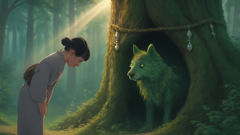
The Hoko did not reply with words. Instead, it pressed its head to her palm—a silent answer. In a whirl of mist, the creature vanished back into the hollow, leaving behind only the faint scent of earth and the weight of something ancient settling over her shoulders. The leaves above shivered, and a sudden breeze sent a flurry of petals spinning through the air. As Kana turned for home, she realized that her journey had only just begun. The Hoko’s blessing would not come easily. She would have to prove herself worthy, and in doing so, unravel the tangled roots of trust, sacrifice, and the spirit’s own hidden sorrow.
Memories in the Bark
Sleep came fitfully that night. Kana dreamed of forests within forests: endless corridors of branches, doorways opening onto sunlit glades, roots that pulsed with memory. She woke before dawn, clutching the dog figurine she had offered—now somehow returned to her hand, warm as if it had lain in fur. Days passed, and her mother’s fever did not break. The river ran lower still, and villagers grew fearful. 'The Hoko has judged us unworthy,' some said. Kana would not accept it. Guided by a new resolve, she visited the cedar again. This time, she brought not just food and trinkets but stories—tales of her mother’s kindness, her father’s respect for the trees, her own hope for healing. As she spoke into the hollow, the Hoko appeared once more. Its eyes seemed deeper, flickering with images: storms swirling above green canopies, woodcutters lost and found, children weaving flower garlands at its feet. The forest grew impossibly quiet. The spirit circled her, then led Kana through a maze of tangled roots. She stumbled after it, feeling herself pulled into a dreamlike realm where time bent and memory took shape. Here, she saw her village as it once was—newly settled at the forest’s edge, every home built from fallen wood, every meal shared with gratitude. She watched as a younger version of her father cradled her as a baby beneath blooming cherry trees. She glimpsed villagers bowing in apology for broken branches, and in return, felt the hush of forgiveness in the wind. Yet not all memories were gentle. She saw fire—axemen driven by greed, trees felled without prayer, smoke curling above the roots. She saw the Hoko wounded, its fur scorched, eyes clouded with sorrow. With each vision, Kana’s heart twisted. The spirit was not only guardian, but also witness—bearing the weight of every kindness and every wound. At last, the memory faded and she found herself back beneath the cedar. The Hoko waited, breathing slow and deep. Kana knelt beside it, weeping for both spirit and village. 'How do I mend what’s broken?' she whispered. The Hoko brushed its nose against her cheek—a silent comfort. It showed her a single, glowing acorn, pulsing with soft green light. Understanding blossomed in her chest: renewal would require sacrifice and patience, not just words or offerings. She thanked the spirit, vowing to restore what had been lost, not only for her mother but for all who called the forest home.
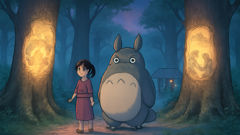
Word spread that Kana had spoken with the Hoko. Some doubted; others watched for signs. But when gentle rain finally began to fall, coaxing shoots from parched earth, even the most skeptical bowed to the woods and left gifts at the cedar’s base. Kana tended to her mother, mixing new medicines from freshly sprouted herbs. Each day she visited the ancient tree, telling stories, planting seeds, mending broken branches. Slowly, the Hoko began to trust—not just Kana, but the whole village. In return, the spirit’s presence grew stronger: wildflowers bloomed in places once bare, lost children found their way home, and the woods rang with birdsong once again.
The Bargain and the Blessing
Summer faded, and with it came a new threat. A distant lord arrived in the valley, demanding tribute of timber for his castle’s expansion. His men eyed the old groves hungrily, axes glinting in their belts. The villagers pleaded with Kana to intercede; they feared both the lord’s wrath and the Hoko’s vengeance if the ancient trees fell. Torn between loyalty and dread, Kana sought guidance from the cedar once more. The spirit met her in silence. This time, though, she sensed its fear—a tremor in its paw, a dullness in its sapphire eyes. The Hoko could defend its woods, but violence would only deepen old wounds. Kana realized the burden was now hers. She approached the lord’s encampment at dawn, heart pounding beneath her robe. She spoke with humility but unwavering resolve. 'There is a spirit in these woods,' she warned, 'older than your bloodline. If you cut these trees, you risk not only our curses but nature’s vengeance.' The lord laughed at first—until storms battered his tents, and his horses fell sick with no cause. He sent his men into the forest, but they lost their way, returning pale and shaken, swearing they’d heard growls in the mist and glimpsed glowing blue eyes. Rumors spread quickly. Remembering tales from his own childhood, the lord reluctantly agreed to spare the groves—on one condition: the village must provide double rice tribute for a year. It was a steep price, but one Kana accepted. In exchange, she asked that his men help plant new saplings at the edge of the woods, restoring what had been lost elsewhere. The lord agreed, eager to leave before his luck soured further.
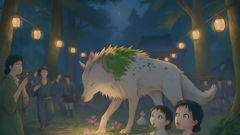
That night, as rain drummed gently on cedar leaves, Kana brought her bargain to the Hoko. The spirit listened, then circled her three times before vanishing into the heart of the tree. The next morning, villagers awoke to find the woods alive with color: mushrooms sprouted in fairy rings, streams flowed clear and cold, and her mother finally rose from bed, color blooming in her cheeks. The Hoko appeared at the edge of the village—not as a warning this time, but as a quiet blessing. Children watched in wonder as it nosed through their gardens, leaving trails of wildflowers where its paws touched earth. In gratitude, the village held a festival beneath the great cedar. Lanterns bobbed in the branches, songs rang out among the roots, and Kana danced with her family, laughter echoing through the night. The Hoko lingered in the shadows, watching with soft eyes as humans and nature celebrated together.
Conclusion
Years passed, and Kana’s hair silvered, but her bond with the Hoko never faded. She became the village’s wise woman, teaching each new generation to honor the forest and its guardian. The great cedar grew taller still, its hollow marked with fresh offerings and tiny carved dogs. The villagers learned that true blessings required stewardship and sacrifice—lessons passed down in whispered tales and quiet acts of care. The droughts returned sometimes, as did storms and fear, but never again did the woods or their spirit turn away from those who respected them. In time, even travelers from distant lands came to marvel at Kawasemi’s groves—lush and vibrant, alive with stories. Some claimed they glimpsed a mossy dog vanishing among the roots; others left without seeing a thing but felt changed all the same. The myth of the Hoko endured not as a warning or a curse, but as a promise: that in every leaf and every breath of wind lived memory and hope, and that guardianship was not just the work of spirits but of every heart willing to listen. And so the ancient woods remained—forever watched over by a dog with blue eyes and a village that remembered what it meant to belong.

